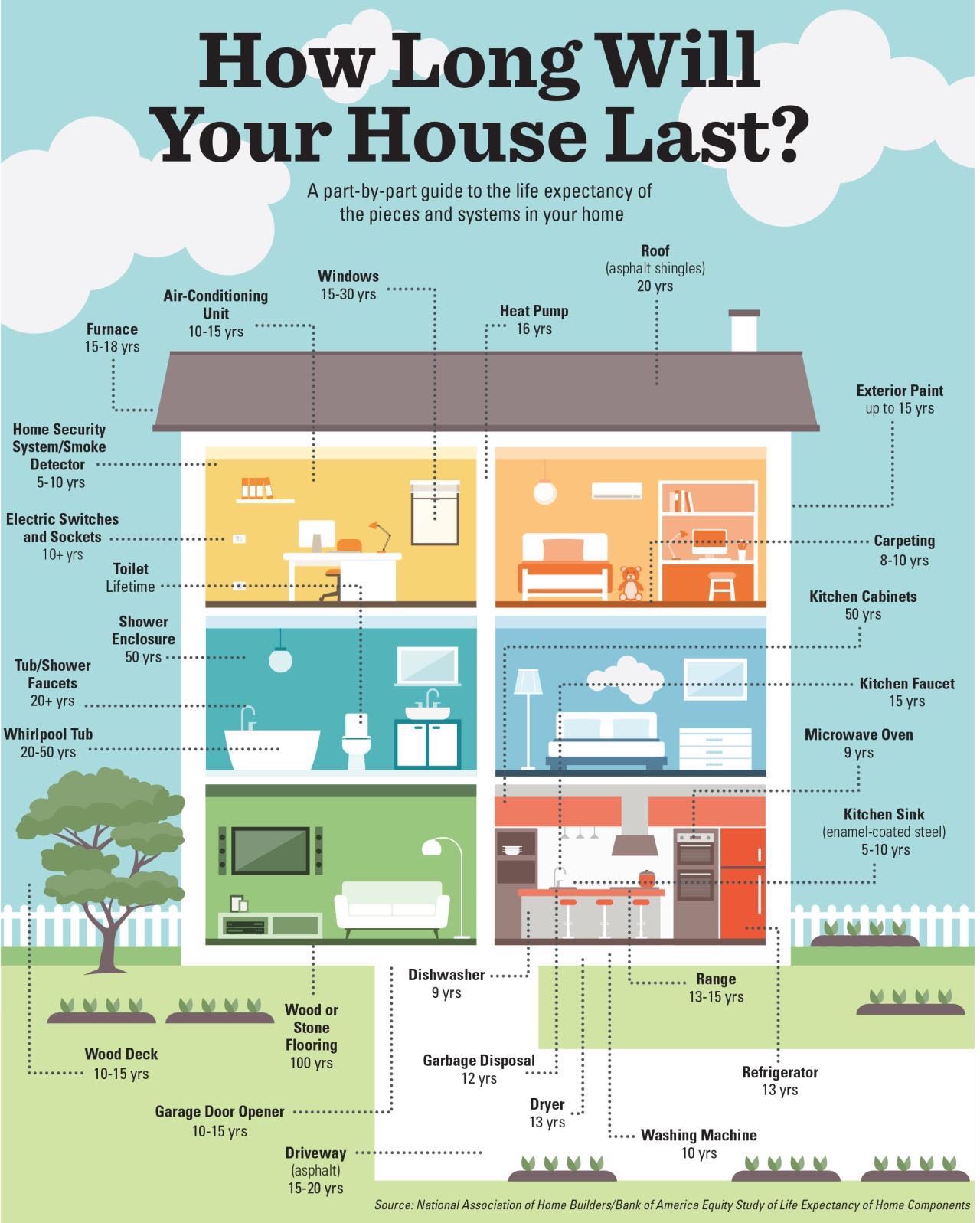How to Maximize the Lifespan of Your House
From appliances to flooring to the construction of the house itself, you want to extend the life of your home for as long as possible. Sadly, nothing lasts forever, and replacement costs can add up when you’re dealing with household items you use everyday. To maximize the lifespan of your house, you need to know the expected age of all the home’s key components, and learn how to properly care for each of them.
Average lifespan for common appliances
Every appliance has a different average lifespan. This length of time drops dramatically if items aren’t given the proper care or regular maintenance. Lifespan is also impacted by frequency of use, which is good to note if you’ve already got an older appliance in your home.
In general, an appliance installed correctly, well maintained, and used a reasonable amount of time will last to the end of its expected life. This in turn will help you maintain a higher resale home value.
Heater/furnace
Average lifespan: 16-20 years
The heating system is a unique appliance to care for because it’s not the appliance itself, but what it’s connected to that keeps things running well. Keep flammable objects away from the heater and routinely install fresh filters. Make sure you know where all the vents are in your home and keep them clear of dust and free from any blockage. Don’t put large pieces of furniture up against a vent. Ductwork can be cleaned by professionals every few years to make sure ventilation pathways stay clear.
Air conditioner
Average lifespan: 10-15 years
Care for air conditioners is all about creating a routine. Timing your maintenance around the changing of the seasons is a good way to remember to regularly change or clean the air filters to maintain the efficiency of the system. You should also check the evaporator coil every year and dust it off if necessary. The part of your unit that’s outside is a separate issue, and can get very dirty during certain times of the year. Be extra observant during fall and winter to clear away any foliage that falls on top or gets stuck to the sides of the unit.
Washer and dryer
Average washer lifespan: 10 years
Average dryer lifespan: 13 years
The most important tip for caring for washers and dryers — don’t overload. For either appliance, leave some room for what you’re cleaning to slosh around. Use the right type and amount of detergent in the washer, and leave the door open after use to dry it out. Keep the lint screen clean in the dryer by wiping it after each load. Wipe down everything regularly and keep an eye on the dust build-up around and behind your dryer. You may also want to clean out the dryer’s vent system every so often to make sure it stays clear.
Expected lifespan of kitchen appliances
Kitchens tend to be the heart and soul of the home, and the area where you spent large portions of your time. They are also the spot where you’ll find some of the most heavily used appliances.
Oven
Average lifespan: 15-25 years
Ovens are great since most come with a self-cleaning function. With just the push of a button, you can keep it clean and operating at its best. The only other work you need to do is check the oven’s burners periodically to ensure the coils have no deformities or damage. Even a small spot on a coil that looks redder when heated up is a sign that the oven is about to short. This can lead to significant damage, so keep an eye out for any abnormalities.
Garbage disposal
Average lifespan: 15 years
Common wear and tear for disposals leads to the blade wearing down or the motor burning out. To lengthen the amount of time before this issue arises, know what should and shouldn’t go down the drain. The list of no-no’s includes:
- Coffee grounds
- Bones or shells
- Food items that expand when they get wet, like grains or pasta
- Nuts
- Egg shells
- Fibrous vegetables like pumpkins
- Fruit pits
Onion skins, potato peels, and corn husks are also not recommended for disposals. Especially in large quantities, these items can not only break the disposal, but clog the drain entirely.
Everyday care for your disposal includes keeping an eye on build-up. You can decrease the level of build-up by using cold water instead of hot when your disposal is running. You can also clean your disposal with a degreaser.
Gas range
Average lifespan: 15 years
Keeping your range clean is the best way to give your stove a long life. Not only that, but it keeps your burners working right. A dirty burner cap can impact ignition and create poor distribution of heat on the burner. This leads to food cooking unevenly. If anything on the stove spills over, wait until the range cools and then clean immediately. Keep food residue and grease from building up, and avoid using abrasive cleaners. Don’t forget to check under the hood for build-up as well. These tips work for any type of stove.
Refrigerator
Average lifespan: 10 years
To keep your fridge working effectively, for the longest amount of time possible, there are a few maintenance tasks you should remember:
- Replace the water filter and air filter per the user manual. Most suggest you do this twice a year.
- Regularly vacuum any exposed condenser coils to keep them free from dust. This ensures proper air circulation.
- Make sure door seals stay tight and secure to not only keep the fridge running effectively, but also to prevent food from spoiling.
Your fridge should stay between 37-40 degrees Fahrenheit, while you freezer should be at zero degrees. A full fridge actually runs best, so if you find it too hard to keep your fridge stocked, you may need a smaller model.
Microwave
Average lifespan: 10 years
Keeping your microwave clean actually increases its life, so giving it regular attention when you clean the kitchen pays off. Wipe down the inside and outside to get rid of grease and pull out the turntable dish periodically for a cleaning. Using any all-purpose cleaner should be fine.
Another way to increase the life of your microwave is to treat it nicely. Don’t slam shut or yank open the microwave door, especially while the microwave is running. Never run the microwave without anything in it, and keep items like foil and metal out. If any small parts break, like the light or the turntable, replace them as soon as you can. They’re an easy fix.
Further reading: What Homebuyers Really Want in a House
Expected lifespan of major structural components
Of course, keeping your house in good condition for as long as possible also means caring for its major structural needs, and understanding when they need may attention. Thankfully, a well constructed home with good bones may have components that will outlive you (i.e. floors and foundations).
Here are some things to make note of:
- Roof – Average lifespan: 10 years
- Wood or stone flooring – Average lifespan: Up to 100 years
- Windows – Average lifespan: 25 years
- Faucets – Average lifespan: 20 years
- Driveways – Average lifespan: 20 years
- Electrical panel – Average lifespan: 60 years
- Plumbing – Average lifespan: 50+ years
These might need replacing too
Finally, to ensure a good resale value of your house you also need to keep cosmetic and safety features fresh and up-to-date. Keep in mind the lifespans of these other common household items:
- Security systems last between 5-10 years, depending on advances in technology.
- Carpet can last between 8-10 years based on foot traffic, wearing, and staining.
- Smoke detectors should be replaced every 10 years, and tested monthly.
- Exterior paint can last up to 20 years but probably deserves attention after 15.
- Wooden decks and fences should go for 20 years depending on climate.
These are just a few examples, but everything has a life expectancy in a house. They might not all come due while you’re living there. It all depends on the age of your home, when items were installed, and how well everything has been maintained.
Contact a professional with any concerns about the state of any part of your home. They’ll be able to evaluate the item and give you feedback on how much life it has left.
When it’s time to replace
Should something in your home need replacing while you’re living there, it’s not a bad idea to think about resale value before making a purchase. If you’re expecting a significant return on a new appliance, you may be surprised. It can even hurt resale value if something new doesn’t match the rest of the appliances or it is too high-end for the neighborhood. Energy-efficient items are never a bad purchase, but the savings comes more to you while you’re using them even though they’re an attractive feature for buyers.
Whether you end up having to replace something in your home while you live there or it survives to the next owner, knowing how to properly care for your home ensures you get the longest life out of everything within it.
When you are ready to sell your home, should you have any concerns about the state of your appliances, there is a way to avoid the hassle of repairs and replacements. Request an offer from an investor on Sundae’s marketplace. We help sell houses as-is for the highest price possible.
Ready to Get Started?
Sell as-is. Pay zero fees to Sundae. Move on your time. No repairs, cleanings, or showings.

